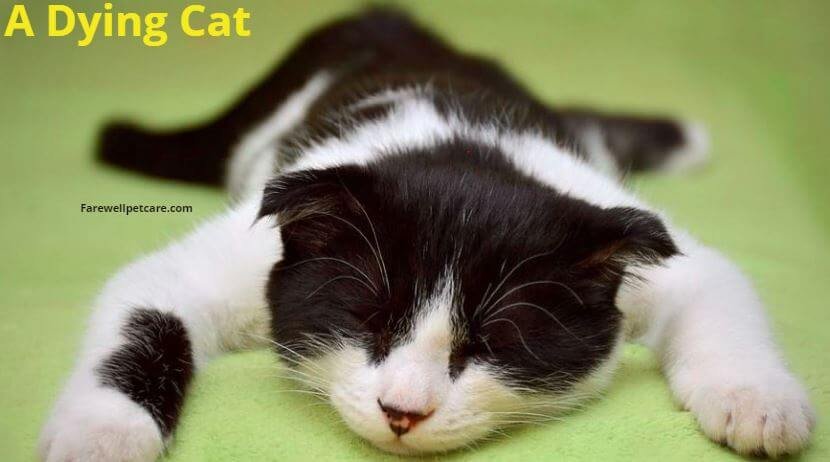Do cats want to be alone when dying? It’s a common question many cat owners have as they naturally worry about the well-being and comfort of their beloved furry friends. However, knowing the signs to look for is vital in understanding if your cat needs extra care or if this is simply an act of nature.
Cats don’t want to be alone when dying. The fact that cats go away when dying is an evolutionary mechanism whereby, in the wild, cats go away to hide from predators when dying. Furthermore, cats seek to be in a safe and quiet place, free from distraction and noise, so they can pass away peacefully.
Getting a chance to say goodbye to your feline friend makes grieving easier for you, the cat owner. As a result, I’ll discuss the reasons your cat goes away when dying. I’ll also cover the physical symptoms of a dying cat. This will help you prepare to comfort your dying cat. Keep reading!
Reasons Cats Go to Be Alone When Dying

Dying is not an easy time for our feline friends. Cats know when they are dying, a situation that makes them weak and vulnerable. Therefore, cats go to be alone when dying for the following reasons:
1. To Hide From Predators
The wild is full of large and small predators that can take advantage of a weak and vulnerable cat. To keep themselves safe, cats go away to hide when they are dying so that predators don’t spot them.
The notion of a cat going to be alone when dying is an evolutionary mechanism cats have developed to protect themselves from predators.
Find Out: How to Euthanize a Cat at Home
2. To Find a Safe and Quiet Place
Cats seek to find a safe and quiet place when dying so they can pass away peacefully, without distraction or noise.
It’s worth noting that cats are more sensitive than dogs to changes in their environment. The sensitivity of cats is based on the fact that they are territorial animals that get a sense of security from their surroundings.
Therefore, any changes in environmental stimuli like light and sound will disturb their rest and, ultimately, the dying process.
Our homes have many distractors that force cats to go away when dying. Some of these distractors include:
- Loud noises from TVs and radios
- Bright lights
- The presence of animals or people making unnecessary noise
Ultimately, cats instinctively search for a safe and secure spot to pass away peacefully. This is often why cats seek out dark, quiet, and secluded places to die.
The Physical Symptoms of a Dying Cat
One bitter fact you must live with as a feline parent is that your cat will eventually die one day.
Knowing the physical symptoms of a dying cat can help you better prepare for your beloved feline friend’s passing.
Your presence gives a dying cat comfort and helps it to feel safe in those last moments.
So don’t be afraid to show some extra love – it’s the least you can do for your loyal companion! Doing so will give both of you a chance to connect one last time before they go.
Here are the physical symptoms of a dying cat:
1. Poor Appetite and Weight Loss
Poor appetite is usually one of the early physical symptoms of a dying cat.
Cats nearing death often lose their appetite completely, so they don’t feel like eating. You may realize that your cat refuses to eat all of a sudden. As a loving parent, you’ll try getting the cat her best meal, but the situation will remain the same.
The loss of appetite is due to the fact that the cat’s body knows it takes time to process and digest the food. However, the cat doesn’t have this energy when dying because the body is weak and tired to consume anything.
Needless to say, it’s normal for a cat to refuse to eat or drink for one to two days. However, if the situation proceeds to the third day, then your feline friend may be in her eleventh hour. In such a situation, you need a veterinarian’s help to diagnose the cat and the cause of lack of appetite.
The immediate consequence of lack of appetite in cats is rapid weight loss. Therefore, if you notice your cat losing weight quickly, you should visit a veterinarian for further consultation.
2. Lethargy and Sleepiness

When a cat is dying, it spends most of its day sleeping or lounging around in one place. This is because cats know their body is weak and doesn’t have the energy to do much more.
Getting sufficient rest in the world of cats is a top priority. Cats sleep on average 15 hours daily because sleeping is in their genes. However, a cat that sleeps while preparing for death displays different signs from the typical sleeping pattern.
You’ll notice your cat sleeping more and taking longer naps than usual. In some cases, cats will be in a coma-like state where they appear utterly unresponsive to their environment. This is the most evident sign of a dying cat as it’s clear that the animal has very little energy left in its body.
3. Visible Deterioration in Health
Most organs start shutting down as the cat prepares for death. The shutting of these organs leads to the deterioration of the cat’s health.
A cat whose health is deteriorating due to the dying process displays the following signs:
- Vomiting
- Diarrhea
- Labored breathing
- Weakness in limbs
- Lack of coordination and balance
You may also notice your cat’s body becoming cold as death approaches. This is due to the fact that their circulation has decreased and their body isn’t able to maintain an optimal temperature.
The physical deterioration of a cat’s body preparing for death is a difficult sight to witness. But this process helps you understand that your cat’s end-of-life journey is nigh and you should do anything possible to make it smooth.
4. Frequent Seizures
The occurrence of frequent seizures (convulsions or fits) is a vital sign of a dying cat.
A seizure describes a sudden surge in the brain’s electrical activities. The consequence of this surge in cats is symptoms like:
- Tremors
- Shaking
- Twitching
- Loss of consciousness
These seizures can be caused by several reasons like tumors, inflammation, and trauma. In any case, it’s essential to seek the help of a veterinarian as soon as possible.
Seizures may happen in cats from time to time. However, a dying cat will experience frequent seizures that may occur daily. These frequent seizures translate into epilepsy, where you may notice clusters of seizures daily.
Cat seizures before death also indicate a lack of oxygen in the brain or because her organs are shutting down.
5. Lack of Grooming
Cats spend between 30 and 50 percent of their time grooming themselves. They spend this much time keeping their unruly hair in check and removing dead skin cells. However, you’ll notice a drastic decrease in your cat’s grooming habits when death is imminent.
A dying cat will not have enough energy to clean her body as usual. As most of the body organs shut down, the cat remains lying in one place helplessly, unable to groom herself as usual.
The lack of grooming leaves the cat appearing shaggy. You may start noticing some signs like:
- Matted fur
- Fleas on her skin
- A musty smell
These signs further confirm that your cat is dying and you should do anything to make the process as smooth as possible.
6. Changes in Physical Appearance
Paying close attention to your feline’s ears, eyes, and nose is crucial when she is dying. You should look out for signs like:
- Whitening in the eyes
- Dullness in the coat
- Discharge from the nose
- Change of color of the tongue
When a cat is dying, her eyes become whitish due to insufficient blood circulation. As already mentioned, most organs, like blood vessels, begin shutting down. The heart will not have sufficient energy to pump blood throughout the cat’s body. Consequently, her eyes will appear whitish.
You’ll also notice a dullness in her coat due to the lack of grooming and nutrition. The cat’s tongue could also change color due to dehydration or because toxins from other organs have poisoned it.
Finally, you may notice a discharge from your cat’s nose as death approaches. This is due to the secretion of mucus that happens when a cat is dying.
7. Excessive Hiding
Cats are lively creatures that are very sociable in the right environment. However, this is not the case with a dying cat. Such a cat will hide from people most of the time. You may notice that the cat refuses to come out of the hiding spot no matter what you try.
One way to notice that the cat loves hiding is when it spends most of the time in dark and secluded places. You’ll always find the cat behind the fridge, under tables, or coaches in an indoor environment.
If you let the cat out, it will always go to the same spot. Even if you call its name or try to feed it, the cat won’t look in your direction. It continues hiding from people and all other activities as death approaches.
It’s your responsibility to find where your sick cat is hiding at all times. This is because an ill cat will not try to drink water or eat any food. As a result, you’ll need to take the food and water to her.
Cats are creatures of habit, and when death approaches, they want some quiet time. They want to be left alone in secluded places as death gets closer. This is their natural way of saying goodbye. So if you find your cat hiding more often than usual, it may be a sign that it’s time to take a trip to the veterinarian.
8. Excessive Drooling
Drooling is a common phenomenon in cats. Most cats drool when in a relaxed position, like sleeping or eating. But when a cat drooling before death is also a physical symptom of a dying cat.
Excessive drooling in cats before death happens when the body cannot regulate its temperature due to the failure of the organs responsible for doing so. As such, the cat will pant heavily and start drooling uncontrollably as death approaches.
It’s important to note that excessive drooling can also be a symptom of an underlying medical condition. Dental diseases that irritate a cat’s mouth are among the leading causes of drooling. In this case, the cat drools to remove or soothe the irritation. This is common in cats over 3 years of age since they are prone to gum diseases.
Expert Tip: It’s important to note that cats do not want to be alone when dying. Thus, you should always be around your pet as it passes away. Your presence gives them comfort and assurance during their final moments on Earth, providing them with the emotional connection they need.
Are Cats Scared to Die?
Cats are not scared to die as is the case with humans. When nearing the end of their lives, cats start early preparations by looking for a quiet and safe place to die. This means they are ready to die and want to be in a place far from predators or unnecessary disturbance.
More often than not, cats prefer to die in the presence of their humans. They feel safe, secure, and comforted when with people they trust. Your job as a pet parent is to ensure that you give them all the necessary care during this momentous occasion.
Having said that, cats may not want to be around other animals or even people they don’t know. It’s essential to give them space and be present when death approaches.
Frequently Asked Questions (FAQs)
Do Cats Want to Be Alone When Dying?
No, cats don’t want to be alone when dying. Instead, most cats feel comforted by the presence of their owners during this difficult time. However, it’s important to remember that cats are also creatures of habit and will find a quiet place to die.
What Do Cats Do When They Are Close to Death?
When cats are close to death, they start hiding frequently and become less active. As most organs shut down, the cat becomes lethargic and stops doing usual things like grooming. When this happens, try comforting and feeding her as you wait for the final bow.
Does a Dying Cat Want to Be Held?
A dying cat may become more social and display signs like wanting to be held more often as part of its behavioral changes. This may be accompanied by other signs like becoming more aloof and other changes in its daily routine.
Do Cats Isolate Themselves When They’re About to Die?
Cats isolate themselves when they’re about to die in search of safer places free of predators. Moreover, cats embrace solitude when dying for a peaceful and uninterrupted transition.
What are the physical symptoms of a dying cat?
The physical symptoms of a dying cat might include
- Being aloof during the day
- Aggression without provoking
- Hiding
- lethargy
should I leave my dying cat alone?
As a pet owner who cares deeply for their friend. You might want to leave them alone thinking that’s what they want. However, at the dying cat stage, they grow more affectionate and want to be held during their last moments.
Do cats say goodbye before they die?
Parting with your little fur friend is a very hard thing to go through. In these last moments, you might wonder if your cat is trying to say goodbye.
At the end of its life cycle, your cat might get cuddled as it wants to be held unless it feels too weak to do so. Remember that no matter how it feels, it is important that you say your goodbyes and hug your pet.


Pretty nice post. I just stumbled upon your weblog and wished to say that I’ve really enjoyed browsing your blog posts. After all I will be subscribing to your feed and I hope you write again soon!
My cat Zibwas very close with he was with me for years. Smart even spoke words. He was with me in Alabama, the Carolina’s and Connecticut where most of my career and through two of my wives and one girlfriend.a large part of my life, he hung out with me loved riding with n my s-10 truck and my newer cars. he passed in CT. He avoided me. Didn’t want to be held. He’d jump right down. He just laid. Wife force fed him with a syringe. I told her not too she finally gave up. He started getting fluid again n him. The vet said I needed to put him down. I’m f would be really bad when the end comes. It took awhile. I just couldn’t do it at first. But gave in. The vet said it would have been bad if I let it go. So I buried him in Connecticut. We didn’t know about cremation then. But he showed signs of being around in spirit and was happy. I know this.